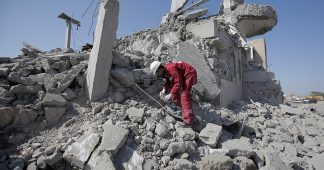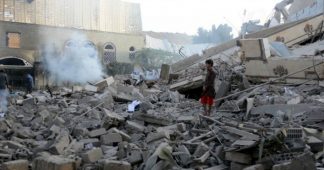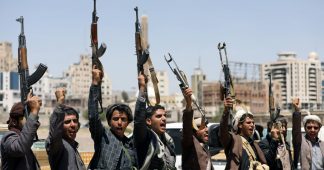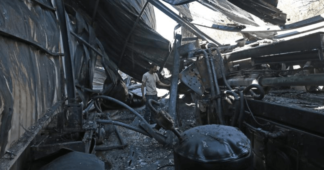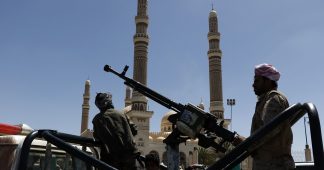What does Abu Dhabi get out of designating their enemies ‘terrorists’? The ability to prolong the war and the suffering indefinitely.
Daniel Larison
March 4, 2022
The UN Security Council passed a new Yemen resolution this week that renewed and broadened the arms embargo on the Houthis and described them as a terrorist group.
The resolution was a partial success for the United Arab Emirates (UAE), which had been agitating for even stricter measures against their enemies in the war that they and the Saudis have been waging for the last seven years. It is unusual for the UN Security Council to refer to one of the parties to an ongoing conflict as terrorists. Using this language is bound to make a diplomatic solution to the war in Yemen even more difficult than it was.
The Security Council vote on Monday is a reminder of the UAE’s ongoing involvement in Yemen, the UN’s biased approach to the war, and Washington’s support for both.
The latest resolution reinforced the provisions of the outdated UNSCR 2216 that has defined the UN approach to Yemen since 2015. There has been a desperate need for the Security Council to update the terms of the resolution, but once again they were content to maintain the failed status quo. UNSCR 2216 has long been seen as an obstacle to peace in Yemen, because it gives all parties to the conflict strong incentives to continue fighting.
The Houthis are never going to accept terms that require them to give up all power and disarm before there is a political settlement, and the Saudi coalition and the Hadi government can hide behind the resolution’s unrealistic requirements to keep the war going. As Bruce Riedel concluded last year, “As long as UNSCR 2216 remains the basis for negotiations, the Houthis will refuse to engage.”
The one-sided condemnations contained in the latest resolution compound the errors of the original. While the resolution condemns “heinous terrorist attacks” on the UAE and Saudi Arabia, there is predictably no mention of the many attacks on civilians carried out by Saudi coalition aircraft. The Houthis have engaged in attacks on civilians and civilian infrastructure, as the resolution says, but the Saudi coalition has been doing the same thing for the duration of the war. There is an annex to the new resolution that describes the Houthis’ crimes, but it doesn’t include any references to the thousands of civilians killed by Saudi coalition airstrikes using weapons provided by the U.S. and other Western governments.
There is unlikely to be any diplomatic progress towards ending the war when the Security Council refuses to hold Saudi coalition governments responsible for their atrocities against Yemeni civilians. The Human Rights Council’s decision last year to shut down the Group of Eminent Experts that had been investigating war crimes committed by all sides was a prelude to this week’s failure.
Broadening the arms embargo will have little effect on the Houthis’ ability to wage war, since the embargo was already applied to the entire group in practice, but it could make it more difficult to alleviate the suffering of the Yemeni people. The embargo is the Saudi coalition’s fig leaf for maintaining its killing blockade that allows them to strangle Yemen’s civilian population under the color of international authority. The people of Yemen continue to endure terrible deprivation as a result of the war and blockade. The World Food Program’s David Beasley was warning just last week that 13 million Yemenis are headed for starvation. This resolution will do nothing to help them, and it could very well make things worse.
The language referring to the Houthis as a terrorist group is apparently not binding on member states, but it was a symbolic win for the lobbying efforts of the UAE, whose government has likewise been pressing the Biden administration to redesignate the Houthis as a foreign terrorist designation in the wake of drone and missile attacks on Abu Dhabi. There is a danger that the UAE could use the language of the new resolution to press the U.S. to designate the group and sanction them accordingly.
The administration is still debating a full designation of the group as a foreign terrorist organization, which it had removed early on in 2021 because of the severe harm that the designation was already doing to the civilian population. As Peter Salisbury and Michael Hanna recently explained, “While it would likely do little to change the Houthis’ posture, an FTO designation would almost certainly greatly compound the humanitarian catastrophe that has been unfolding in Yemen. This is because it would make conducting any kind of business in Houthi-controlled areas, indeed across the entire country, extremely risky for international firms.” The Trump administration already ran this experiment with its last-minute designation of the group in its final days, and during the short time it was in place it was having severe effects on Yemen’s economy.
Describing the Houthis this way caused four members on the council to abstain on the resolution. The Norwegian representative said that they were “worried about unintended humanitarian consequences of this new language and that it could negatively affect UN efforts to address large-scale humanitarian needs throughout Yemen.” Ireland’s deputy U.N. ambassador Jim Kelly took the same position: “We remain concerned that the use of this term in a Security Council resolution dealing with sanctions in Yemen may have unintended negative consequences for the millions of Yemeni people living under Houthi control.”
Russia had previously been reluctant to apply the terrorist label to the Houthis, but the UAE gained Russian support for the new language about the Houthis by abstaining on the resolution condemning the invasion of Ukraine. The UAE later voted against Russia on Wednesday’s General Assembly resolution “deploring” Russia’s actions in Ukraine.
Despite the Biden administration’s decision to rush additional U.S. forces to the UAE to protect against further Houthi attacks, the UAE incredibly claims to have felt “abandoned” by Washington after the strikes on Abu Dhabi. Even though the invasion of Ukraine was a much more significant event that required a swift response at the UN, the UAE thinks that the much smaller attacks on their territory that came as a result of their intervention in Yemen deserved comparable treatment. The remarkable thing here is that the UAE imagines that they are in the same position in Ukraine instead of being the aggressor against Yemen that they are.
This should be a lesson to the Biden administration that the UAE, like other regional clients, will never be satisfied with any level of U.S. support and protection. No matter how many weapons the U.S. sells them and no matter how many of our own forces Washington puts in harm’s way on their behalf, these clients will always claim that they are being neglected so that they can squeeze more gifts out of the relationship. This is what comes from constantly indulging and catering to the preferences of these states.
The Biden administration would be wise to ignore the UAE’s demands to designate the Houthis, and it should realize that the UAE takes U.S. backing too much for granted. The recent deployment of jets and ships to the UAE is a misuse of limited resources, and it puts U.S. personnel at risk in support of an indefensible war. The U.S. should withdraw those forces as soon as possible and let the UAE contemplate what real abandonment might look like.
Published at responsiblestatecraft.org
We remind our readers that publication of articles on our site does not mean that we agree with what is written. Our policy is to publish anything which we consider of interest, so as to assist our readers in forming their opinions. Sometimes we even publish articles with which we totally disagree, since we believe it is important for our readers to be informed on as wide a spectrum of views as possible.
